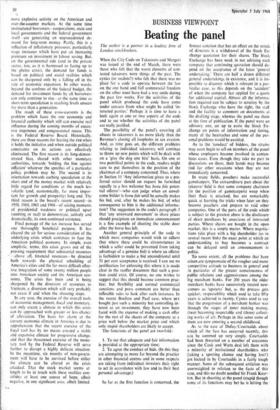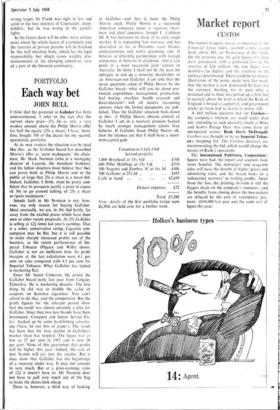Beating the panel
BUSINESS VIEWPOINT
The author is a partner in a leading firm of London stockbrokers.
When the City Code on Takeovers and Mergers was issued at the end of March, there were those who felt that the worst elements of con- tested takeovers were things of the past. The cynics (or realists?) who felt that there was no place for a code to operate between the law on the one hand and full commercial freedom on the other must have had a wry smile during the past few weeks. For the activities of the panel which produced the code have come under censure from what might be called 'in- terested parties.' Perhaps it is time to have a look again at one or two aspects of the code and to see whether the activities of the panel are really justified.
The possibility of the panel's covering all abuses in takeovers is no more likely than the Revenue's closing all loopholes in tax evasion. And, as time goes on, the different problems relating to individual takeovers will continue to throw up new points which will be dealt with on a 'give the dog one bite' basis. On one or two pontifical points in the code, readers might care to put themselves in the position of the chairman of a company concerned. Thus, where in Section 11 `Any information given to a pre- ferred suitor should on request be furnished equally to a less welcome but bona fide poten- tial offeror'—who can judge when an unwel- come bidder is bona fide until he actually makes his bid, and, after he makes his bid, of what consequence to him is the additional informa- tion? The suggestion in the code's paragraph 5 that 'any untoward movement' in share prices should precipitate an immediate announcement is a fine example of shutting the stable door after the horse has left.
Another general principle of the code to which most companies would wish to adhere (but where there could be circumstances in which a seller could be prevented from taking advantage of a genuine bid) is where an offeror is forbidden to make a bid unconditional until 51 per cent acceptance is received. I can see no justification for enforcing this where it is made clear in the reoffer document that such a posi- tion could exist. Of course, no one wishes to suggest that this should become common prac- tice; but flexibility and normal commercial sanctions and press comment are better than inflexible rules to look after such instances. In the recent Boulton and Paul case, where BET bought just such a minority but controlling in- terest as an investment, they have now been faced with the expense of making a cash offer for the rest of the shares of the company at a price well below the market price and which only stupid shareholders are likely to accept.
The functions of the panel are two-fold: 1. To see that adequate and fair information is provided at the appropriate time; 2. To agree the conduct of bids. (In this they are attempting to move far beyond the practice in other financial centres and in some respects are taking from individual investors their right to act in accordance with law and to their best personal advantage.) So far as the first function is concerned, the
firmest sanction that has an effect on the minds of directors is a withdrawal of the Stock Ex- change quotation for their shares. The Stock Exchange has been weak in not advising each company that continuing quotation should de- pend on the acceptance of the latest 'general undertaking.' There are half a dozen different general undertakings in existence, and it is im- possible to discover which is relevant in a par- ticular case, as this depends on the `accident' of when the company last applied for a quote for additional capital. Almost all the informa- tion required can be subject to scrutiny by the Stock Exchange who have the right, the staff and the facility to comment on documents at the drafting stage, whereas the panel see them at the time of publication. If the panel were an advisory one, set up to assist the Stock Ex- change on points of information and timing, many of the heartaches and some of the per- sonal problems would be avoided.
As to the `conduct' of bidders, the strains may soon begin to tell on members of the panel whose employers become involved in conten- tious cases. Even though they take no part in discussions on these, their hands may become tied for other occasions when they are not immediately concerned.
In many fields, poachers make successful. gamekeepers. The extraordinary part about the takeover field is that some company chairmen (in the position of gamekeepers) weep when their flock is attacked, but are remarkably quick at learning the tricks when later on they become poachers and prepare to raid other companies. One of the parts of the code which'. is subject to the greatest abuse is the disclosure of share purchases by associates of interested parties. Where shares are bought in the open market, this is a simple matter. Where negotia- tions take place with a big shareholder (as 'in several recent bids) the exact point at which an understanding to buy becomes a contract can be delayed until an announcement is politic.
To some extent, all the problems that have arisen are symptomatic of the rougher and more competitive attitude to business in general and in particular of the greater consciousness of public relations and aggressiveness among the big merchant banks. For 200 years the older merchant banks have successively treated new- comers as `upstarts' but, as the process gets quicker, respectability which used to take fifty years is achieved in twenty. Cynics used to say that the progression of a merchant banker was through the stages of (one) making money, (two) becoming respectable and (three) collect- ing works of art. Perhaps in this sense some of them are npw entering a second childhood.
As to the case of Dufay/Courtaulds about which all the fuss has occurred recently, this can be summed up very simply. Courtaulds had been thwarted on a number of occasions since the Cook and Watts deal left them with a minority of institutional shareholders who (taking a sporting chance and having lost!) got locked in by Courtaulds in a fairly tough manner. Some of the subsequent criticism was overweighted in relation to the facts of this case, and this no doubt needled Sir Frank Kear- ton. But in shooting at the panel (stupid though some of its functions may be) he is hitting the
wrong target. Sir Frank was right in law and acted in the best interests of Courtaulds' share- holders: but he was wrong in the panel's lights.
In the future there will be other more serious cases where the whole future of a company and the interests of private persons will be baulked by this well meaning body, which has no legal responsibility but which issues weighty pro- nouncements of the changing consensus view of a part of the financial community.











































 Previous page
Previous page